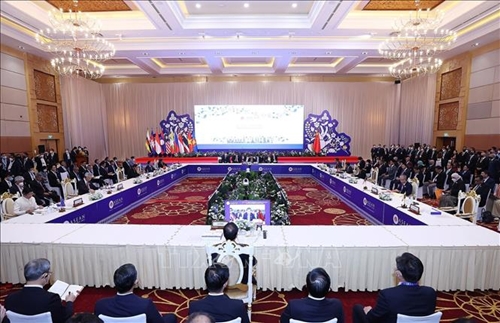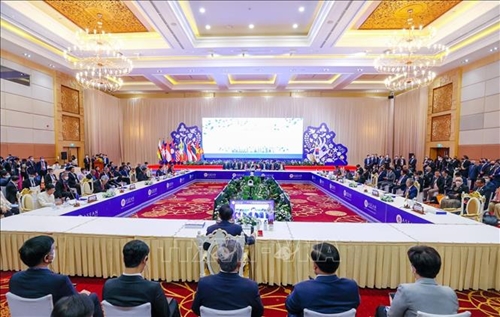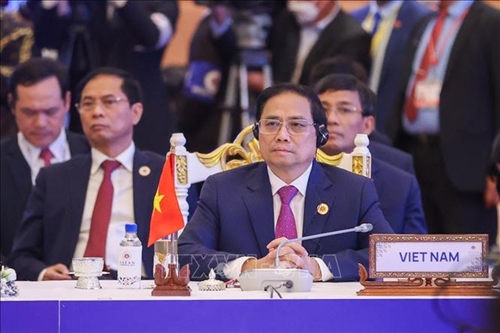    |
 |
|
At the 25th ASEAN-China Summit |
Partners expressed their appreciation for ties with ASEAN and committed to promoting dialogues, cooperation, and effective response to challenges, contributing to shaping an open, inclusive, and transparent regional architecture, and upholding international law with ASEAN playing a central role.
During the 25th ASEAN-China Summit, ASEAN leaders and Chinese Premier Li Keqiang hailed the establishment of bilateral comprehensive strategic partnership in late 2021 as an important milestone in the development history of their ties.
Describing ASEAN as a high priority in China’s neighborhood policy, Li reaffirmed respect for ASEAN’s central role in regional architecture and wished to effectively realise the newly-established comprehensive strategic partnership with the bloc. He vowed to assist ASEAN in building the Community and upholding its role in regional and global forums.
ASEAN and China remain the top trade partners of each other with two-way trade hitting 669 billion USD and China’s foreign direct investment (FDI) into ASEAN reaching 13.6 billion USD last year. Both sides agreed to soon reopen the markets, resume economic, trade and investment exchanges, stabilize the connection of supply chains, help businesses access each other's market, step up talks to upgrade the ASEAN-China Free Trade Area and effectively carry out the Regional Comprehensive Partnership (RCEP) to bringing practical benefits to residents and businesses.
ASEAN proposed China expand coordination in digital transformation, digital economy, climate change response, energy transition, green and sustainable development. The bloc also wished China to continue narrowing the development gap and develop sub-regions, including the Mekong sub-region.
In his speech, PM Chinh suggested both sides jointly boost trade and investment, open the economies in which China continues to expand the import of Vietnamese goods and farm produce as well as those of ASEAN countries that transit through Vietnam, further facilitate customs clearance, and ensure smooth trade in any situation, promote the diversification of modes of freight transport by road, rail, sea, and air, contributing to stabilising supply and production chains and propelling a balanced and sustainable trade.
ASEAN and China need to coordinate to ensure recovery towards sustainable development, including expanding cooperation in green development, environment protection; improving the biodiversity, stability, and sustainability of ecosystem, and climate change response, he said.
Concluding the event, both sides adopted the Statement commemorating the 20th anniversary of the Declaration on the Conduct of Parties in the East Sea (South China Sea), the Joint Statement on enhancing common and sustainable development, and another on cooperation in food security.
Addressing the 23rd ASEAN-RoK Summit, PM Chinh suggested the two sides fully restore cooperation towards sustainable development to bring practical benefits to the two peoples, focusing on healthcare, people-to-people exchange, tourism, human resources development, technology, digital transformation, disaster management, climate change response, green growth while ensuring benefits of citizens living and working in each side.
    |
 |
|
At the 23rd ASEAN-RoK Summit |
He urged ASEAN and the RoK to make it easier for their businesses to access markets, facilitate the export of agricultural and aquatic products, seafood, fruits from ASEAN countries, including Vietnam, to the RoK, create favorable conditions for ASEAN enterprises to join the RoK’s regional and global supply chains, and at the same time stepping up Mekong sub-region collaboration via the Mekong-RoK Partnership framework.
Amid increasingly complex and uncertain developments in the region and the world, the Vietnamese PM suggested both sides work closely together to accelerate dialogues, cooperation, trust building, and make responsible contributions to coping with regional security challenges such as the East Sea and the Korean Peninsula.
On the occasion, he thanked the RoK and ASEAN member states for supporting Vietnam’s initiative to hold “RoK Day in ASEAN” in Vietnam next year, toward the 35th anniversary of ASEAN-RoK ties in 2024.
RoK President Yoon Suk-yeol introduced the RoK’s strategic framework for a free, peaceful and prosperous Indo-Pacific region, and wished to partner with ASEAN to implement the ASEAN Outlook on the Indo-Pacific (AOIP) through practical cooperation programs and activities.
The RoK is now ASEAN's the fifth largest trading partner and fifth biggest foreign direct investor. Two-way trade hit nearly 189.5 billion USD and the RoK’s FDI in ASEAN reached 7.1 billion USD last year. About 1.82 million Koreans visited ASEAN member states in 2021.
Both sides vowed to enhance cooperation in response to emerging non-traditional security challenges such as terrorism, transnational and cyber crimes, maritime security cooperation; promote trade and support businesses and start-ups, cultural exchange, education, tourism; expanding priority to cooperation in energy transformation, smart city development, digital transformation, digital economy, green development, and climate change response, in order to upgrade bilateral partnership in the future.
In his speech to the ASEAN-U.N. Summit, PM Chinh proposed both sides work closely together to boost peace values, strengthen dialogues, cooperation, trust building and law respecting, speed up socio-economic recovery and development efforts, settle regional and global challenges towards green and sustainable development, ensure balance and harmony between economic and socio-cultural development, and narrow development gap and develop sub-regions, including the Mekong sub-region, inclusive growth and even development.
On the occasion, the PM asked the U.N. to help Vietnam access financial resources, technology, human resource training, national governance, and technical expertise to effectively and responsibly deliver on its climate change commitments, ensure fair energy transition, contributing to mitigating negative impacts on workers, the poor and vulnerable groups.
Vietnam will make active, proactive and responsible contributions to the U.N.’s common work and strive to fulfil its responsibility as a member of the U.N. Human Rights Council for the 2023-2025 tenure, he said.
ASEAN and the U.N. pledged to strengthen coordination to effectively implement the Roadmap for Mutual Assistance for the ASEAN Community Vision 2025 and the U.N. Agenda for Sustainable Development till 2030.
On regional and global issues at summits, PM Chinh and leaders of partners underscored the importance of maintaining an environment of peace, security and stability in the region, including the East Sea which is a common concern and interest of countries.
    |
 |
|
Prime Minister Pham Minh Chinh at the ASEAN-U.N. Summit |
Accordingly, ASEAN asked partners to back its principle stance on the East Sea issue as well as efforts to build an effective and substantive Code of Conduct in the East Sea (COC) in accordance with international law and the United Nations Convention on the Law of the Sea (UNCLOS) 1982, towards building the East Sea into a water of peace, stability, cooperation and sustainable development.
Partners vowed to continue supporting ASEAN’s role and efforts in promoting dialogues and reconciliation, assisting Myanmar in seek solutions to stabilising the situation.
Expressing concern over the recent developments on the Korean Peninsula, ASEAN expressed support for efforts to promote peace, stability and complete denuclearization of the Korean Peninsula. The block affirmed its readiness to play a constructive role and facilitate dialogues among stakeholders in mechanisms chaired by ASEAN.
Source: VNA